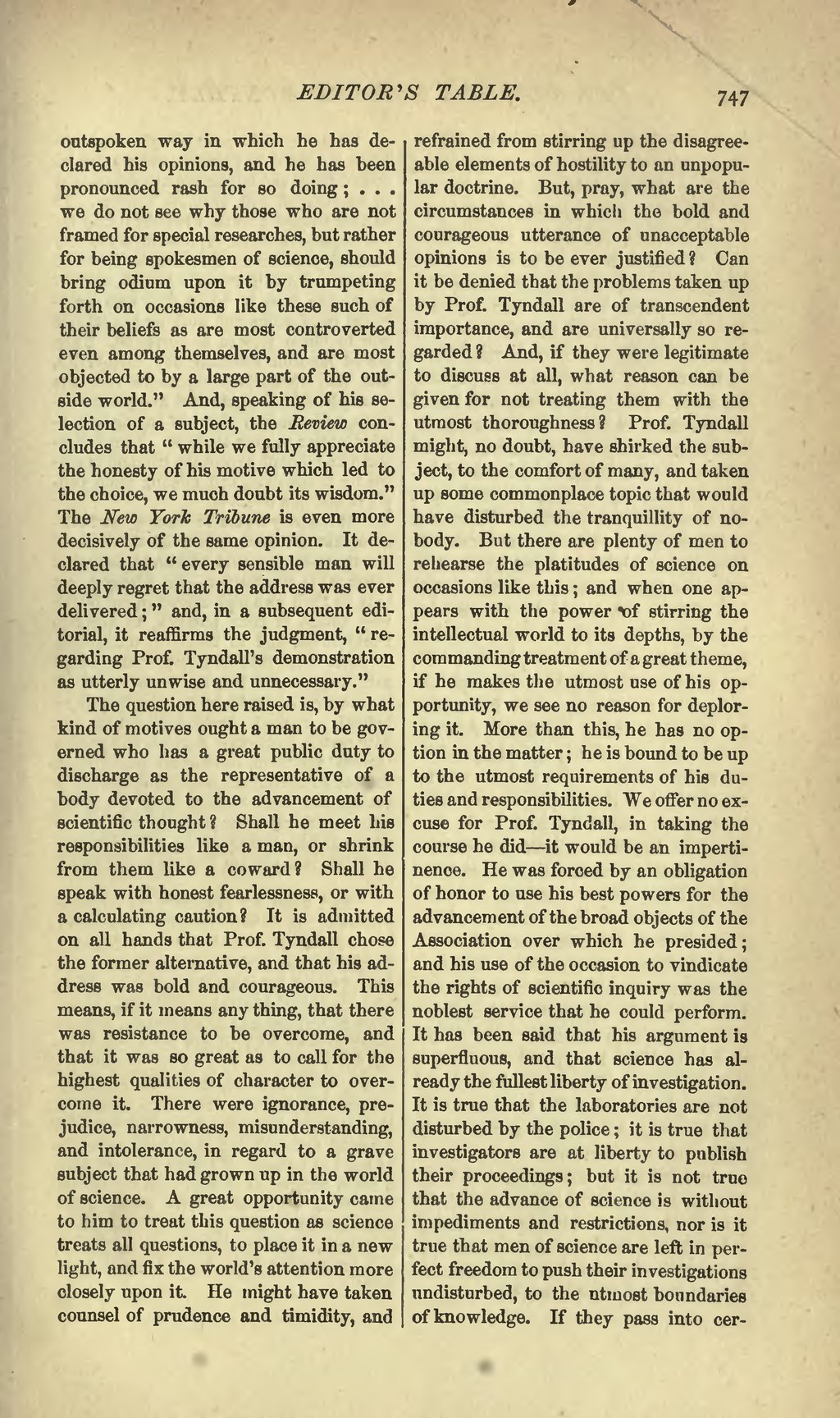outspoken way in which he has declared his opinions, and he has been pronounced rash for so doing; . . . we do not see why those who are not framed for special researches, but rather for being spokesmen of science, should bring odium upon it by trumpeting forth on occasions like these such of their beliefs as are most controverted even among themselves, and are most objected to by a large part of the outside world." And, speaking of his selection of a subject, the Review concludes that "while we fully appreciate the honesty of his motive which led to the choice, we much doubt its wisdom." The New York Tribune is even more decisively of the same opinion. It declared that "every sensible man will deeply regret that the address was ever delivered;" and, in a subsequent editorial, it reaffirms the judgment, "regarding Prof. Tyndall's demonstration as utterly unwise and unnecessary."
The question here raised is, by what kind of motives ought a man to be governed who has a great public duty to discharge as the representative of a body devoted to the advancement of scientific thought? Shall he meet his responsibilities like a man, or shrink from them like a coward? Shall he speak with honest fearlessness, or with a calculating caution? It is admitted on aU hands that Prof. Tyndall chose the former alternative, and that his address was bold and courageous. This means, if it means any thing, that there was resistance to be overcome, and that it was so great as to call for the highest qualities of character to overcome it. There were ignorance, prejudice, narrowness, misunderstanding, and intolerance, in regard to a grave subject that had grown up in the world of science. A great opportunity came to him to treat this question as science treats all questions, to place it in a new light, and fix the world's attention more closely upon it. He might have taken counsel of prudence and timidity, and refrained from stirring up the disagreeable elements of hostility to an unpopular doctrine. But, pray, what are the circumstances in which the bold and courageous utterance of unacceptable opinions is to be ever justified? Can it be denied that the problems taken up by Prof. Tyndall are of transcendent importance, and are universally so regarded? And, if they were legitimate to discuss at all, what reason can be given for not treating them with the utmost thoroughness? Prof. Tyndall might, no doubt, have shirked the subject, to the comfort of many, and taken up some commonplace topic that would have disturbed the tranquillity of nobody. But there are plenty of men to rehearse the platitudes of science on occasions like this; and when one appears with the power of stirring the intellectual world to its depths, by the commanding treatment of a great theme, if he makes the utmost use of his opportunity, we see no reason for deploring it. More than this, he has no option in the matter; he is bound to be up to the utmost requirements of his duties and responsibilities. We offer no excuse for Prof. Tyndall, in taking the course he did—it would be an impertinence. He was forced by an obligation of honor to use his best powers for the advancement of the broad objects of the Association over which he presided; and his use of the occasion to vindicate the rights of scientific inquiry was the noblest service that he could perform. It has been said that his argument is superfluous, and that science has already the fullest liberty of investigation. It is true that the laboratories are not disturbed by the police; it is true that investigators are at liberty to publish their proceedings; but it is not true that the advance of science is without impediments and restrictions, nor is it true that men of science are left in perfect freedom to push their investigations undisturbed, to the utmost boundaries of knowledge. If they pass into cer-
